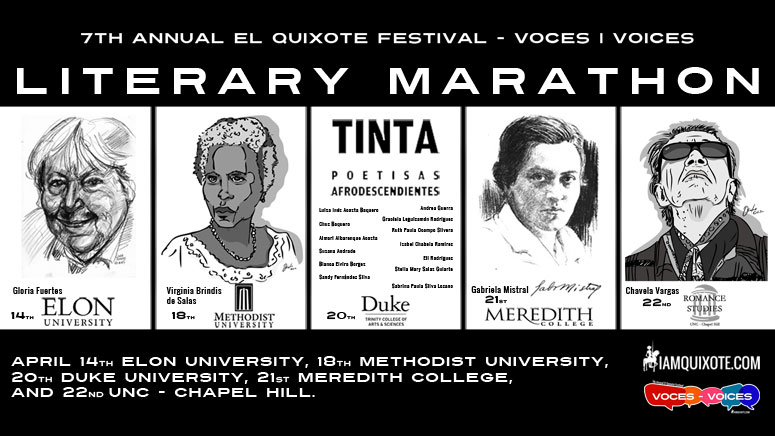
April 14-22
Artist Studio Project in collaboration with several universities and colleges invite you to participate in the 7th Annual week long El Quixote Festival Literary Marathon 2021- 2022.
This year we are proud to Celebrate Voces – Voices of women.
Join us for this historic event as we read aloud the writings of inspiring literary figures.
Artist Studio Project en colaboración con varias universidades y colegios lo invitan a participar en la séptima semana anual del Maratón Literario del Festival El Quijote 2021 – 2022.
Este año estamos orgullosos de celebrar Voces – Voices de la mujer.
Únase a nosotros para este evento histórico mientras leemos en voz alta los escritos de figuras literarias inspiradoras.
Gracias especiales a: Jonathan Wade, Mina Garcia, Luis Navarro, Javier Pabon y Elena Peña-Argüeso por su trabajo y su colaboración.
ELON UNIVERSITY APRIL 14TH, 10 AM
Gloria Fuertes García (28 July 1917 – 27 November 1998) was a Spanish poet and author of children’s literature, linked to the first Spanish literary movement after the Civil War, 50’s Generation or postism. She became particularly well-known in Spain in the 70’s, after her collaborations on children’s television shows.
Gloria Fuertes García (28 July 1917 – 27 November 1998) fue una poeta y autora de literatura infantil y juvenil española, vinculada al primer movimiento literario español tras la Guerra Civil, la Generación del 50 o el postismo. Se hizo especialmente conocida en España en los años 70, tras sus colaboraciones en programas infantiles de televisión.
METHODIST UNIVERSITY – APRIL 18TH, 10AM
Virginia Brindis de Salas (1908-1958) was a poet of the black community of Uruguay. The country’s leading black woman poet, she is also considered “the most militant among Afro-Uruguayan writers”. Her poetry addresses the social reality of Black Uruguayans.
Virginia Brindis de Salas (1908-1958) fue una poeta de la comunidad negra de Uruguay. La principal poeta negra del país, también es considerada “la más militante entre las escritoras afrouruguayas”. Su poesía aborda la realidad social de los negros uruguayos.
DUKE UNIVERSITY – APRIL 20TH, 10AM
Tintas poetisas afrodescendientes
“In the search to commemorate Afro-Latin women, this book of women’s poetry was proposed. It is time to hear their voices, to tell us about other aspects of what exists, other cultural, religious, and philosophical visions that allow us to make visible what is invisible: the wide influence that Uruguay fortunately has of Afro-descendant culture…” Marcelo E. Ortiz Uriarte
“En la búsqueda de conmemorar a las mujeres afrolatinas es que se propuso este libro de poesía de mujeres. Es tiempo de oír sus voces, de que nos cuenten otras aristas de lo existente, otras visiones culturales, religiosas, filosóficas que nos permitan visibilizar lo invisible: la amplia influencia que afortunadamente tiene el Uruguay de la cultura afrodescendiente…” Marcelo E. Ortiz Uriarte
MEREDITH COLLEGE – APRIL 21ST, 10AM
Gabriela Mistral (1889-1957), pseudonym for Lucila Godoy y Alcayaga, was born in Vicuña, Chile. The daughter of a dilettante poet, she began to write poetry as a village schoolteacher after a passionate romance with a railway employee who committed suicide. She taught elementary and secondary school for many years until her poetry made her famous. She played an important role in the educational systems of Mexico and Chile, was active in cultural committees of the League of Nations, and was Chilean consul in Naples, Madrid, and Lisbon. She held honorary degrees from numerous Universities. The Nobel Prize in Literature 1945.
(nobelprize.org)
Gabriela Mistral (1889-1957), seudónimo de Lucila Godoy y Alcayaga, nació en Vicuña, Chile. Hija de un poeta diletante, comenzó a escribir poesía como maestra de escuela de pueblo después de un apasionado romance con un empleado ferroviario que se suicidó. Enseñó en primaria y secundaria durante muchos años hasta que su poesía la hizo famosa. Desempeñó un papel importante en los sistemas educativos de México y Chile, participó activamente en los comités culturales de la Liga de las Naciones y fue cónsul de Chile en Nápoles, Madrid y Lisboa. Obtuvo títulos honoríficos de numerosas universidades. El Premio Nobel de Literatura 1945.
(premionobel.org)
UNC – CH – APRIL 22ND, 10AM
Isabel Vargas Lizano, ( April 1919 – August 2012) better known as Chavela Vargas, was a Costa Rican singer. She was especially known for her rendition of Mexican rancheras, but she is also recognized for her contribution to other genres of popular Latin American music. The Latin Academy of Recording Arts & Sciences, presented her with a Latin Grammy in 2007.
Isabel Vargas Lizano, (April 1919 – August 2012) mejor conocida como Chavela Vargas, fue una cantante costarricense. Fue especialmente conocida por su interpretación de rancheras mexicanas, pero también es reconocida por su contribución a otros géneros de la música popular latinoamericana. La Academia Latina de Artes y Ciencias de la Grabación le otorgó un Latin Grammy en 2007.
